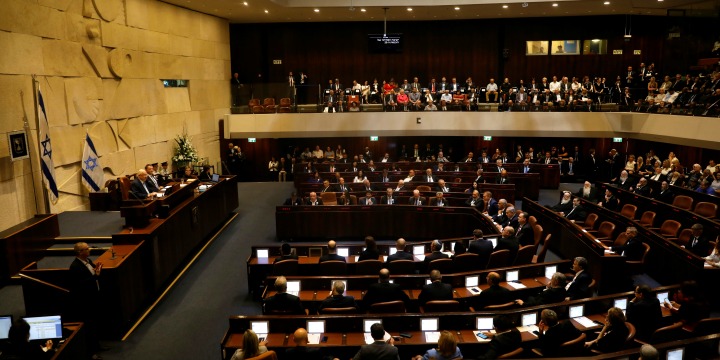A Third Election Is a Catastrophe for Israel
 by Yoel Zilberman
by Yoel Zilberman

Israeli President Reuven Rivlin addresses the opening session of the 22nd Knesset, in Jerusalem Oct. 3, 2019. Photo: Reuters / Ronen Zvulun.
Why don’t the citizens of Israel wake up? Just one month ago, Israel was paralyzed following the airstrike targeting Islamic Jihad terror chief Baha Abu al-Ata. Half the country was immobilized, with hundreds of rockets fired at Israel, paralyzing educational institutions, closing thousands of businesses, and confining hundreds of thousands of people to their homes, unable to leave for work. The economic consequences have been grave, to say nothing of the mental distress and injury suffered by the weak and defenseless.
Last week, new elections were once again declared. This could prove to be catastrophic for Israel.
Unlike the life-threatening rockets flying overhead, in this case, the danger relates to destructive processes, many of which remain hidden from sight. Already, the government has frozen funding for thousands of quasi-governmental entities, projects, and non-profit organizations in the field of welfare, education, employment, and more.
This situation will continue to affect millions of citizens in the coming year. Already, dozens of organizations providing aid in a variety of fields have been forced to close or significantly curtail their activity.
The discourse among political parties as voiced on social and mass media is divisive, vengeful, spiteful, and petty. Whether or not the discourse is justified is irrelevant under the current circumstances. It does nothing to advance national unity, security, or the economy. On the contrary, “the sanctity of factionalism” leads to a crisis of distrust, to undermining the leadership of party heads themselves, and to the organization of citizens endeavoring to overcome the lack of governance. It is unclear how this situation will be rectified now that we are on the path to yet another round of elections.
Civil reticence equals cooperation and even support for this unprecedented crisis of leadership. Have our leaders blundered? Are there those who act immaturely and irresponsibly in the face of colossal and irrefutable damage? How did we reach a situation whereby three elections have paralyzed the country?
Inconceivably, we have been watching the paralysis of Israel’s political leadership for almost a year, waiting for salvation from the ego wars that are crippling the Jewish state. Dozens of core issues and national challenges have been neglected and are on the verge of complete destruction. Over the course of three weeks, social organizations, citizens, and young adults from all over the country banded together to demonstrate before the Knesset in protest of a third election.
Unfortunately, personal interests and egos have prevailed, and we could now witness hundreds of educational, health, and welfare enterprises closing due to budgetary deficits. In the absence of administrative and budgetary decisions, even Israel’s national security is in jeopardy.
This is a time of public emergency during which we must extend brotherly love throughout all parts of society, augment our abilities to see and hear one another, and establish an aspirational vision for the future of Israel and its people. If we let complacency, cynicism, and indifference lead us during the most critical time we have faced over the last decade, then grave dangers are in store.
Inter-party battles, now continuing with the initiation of election campaigns, have led political leaders to mount “high horses,” precluding cooperation. But if civil society can position “ladders” with the hope that broad scale action will spark, connect, unify, and, in the long term, even heal the unjustified hatred that has grown around us — perhaps we can still prevent disaster.
Yoel Zilberman is the CEO and Founder of HaShomer HaChadash, an Israeli NPO that secures the connection of the Jewish people to the land of Israel through education and activism by helping local farmers to safeguard the land.
 Iran Sentences Rapper Toomaj Salehi to Death Over 2022-23 Unrest
Iran Sentences Rapper Toomaj Salehi to Death Over 2022-23 Unrest Netanyahu: ‘Antisemitic Mobs Have Taken Over Leading U.S. Universities’
Netanyahu: ‘Antisemitic Mobs Have Taken Over Leading U.S. Universities’ U.S. Decides Against Sanctions on IDF’s Netzah Yehuda Battalion
U.S. Decides Against Sanctions on IDF’s Netzah Yehuda Battalion Israel Says It Is Poised to Move on Rafah
Israel Says It Is Poised to Move on Rafah Israeli Hostage Hersh Goldberg-Polin Seen Alive in a New Hamas Video
Israeli Hostage Hersh Goldberg-Polin Seen Alive in a New Hamas Video Palestinian Prime Minister Announces New Reform Package
Palestinian Prime Minister Announces New Reform Package France: Man Suspected of Abducting, Raping Jewish Woman ‘to Avenge Palestine’
France: Man Suspected of Abducting, Raping Jewish Woman ‘to Avenge Palestine’ Israel Intensifies Strikes Across Gaza, Orders New Evacuations in North
Israel Intensifies Strikes Across Gaza, Orders New Evacuations in North Iran Threatens to Annihilate Israel Should It Launch a Major Attack
Iran Threatens to Annihilate Israel Should It Launch a Major Attack ‘Completely Baseless’: Reports of Mass Graves at Gaza Hospitals are False, IDF Says
‘Completely Baseless’: Reports of Mass Graves at Gaza Hospitals are False, IDF Says



 U.S. Decides Against Sanctions on IDF’s Netzah Yehuda Battalion
U.S. Decides Against Sanctions on IDF’s Netzah Yehuda Battalion Israeli Hostage Hersh Goldberg-Polin Seen Alive in a New Hamas Video
Israeli Hostage Hersh Goldberg-Polin Seen Alive in a New Hamas Video Iran Sentences Rapper Toomaj Salehi to Death Over 2022-23 Unrest
Iran Sentences Rapper Toomaj Salehi to Death Over 2022-23 Unrest Israel Says It Is Poised to Move on Rafah
Israel Says It Is Poised to Move on Rafah Netanyahu: ‘Antisemitic Mobs Have Taken Over Leading U.S. Universities’
Netanyahu: ‘Antisemitic Mobs Have Taken Over Leading U.S. Universities’